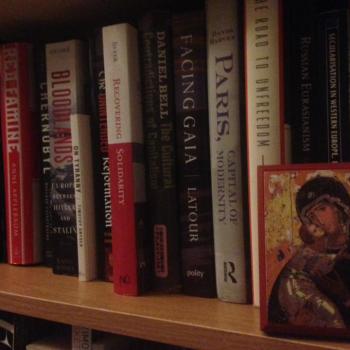
Like most young men in their late teens, I was swimming at the time in an ocean of bad ideas. Fortunately, this was the early 2000s and I was in Canada, so I was not soaking in the same alt-right soup that the Isla Vista men’s rights shooter Elliot Rodger describes in his deranged manifesto. Also, I did not have access to his guns. It was Canada.
I had, however, thrown myself headlong into evangelicalism. It was the age of masculine redemption in that bubble at the time, right off the heels of Promise Keepers and I Kissed Dating Goodbye. Mark Driscoll was on the rise, which meant that the hipster imprimatur was about to be bestowed on the world of the older white men who had invented the word complementarianism almost two decades before in the Danvers Statement to position men as leaders, women as followers, and the movement as a middle way between straight-up patriarchy and all-out feminism. Given my feminist and womanist education in Catholic school, I probably should have known better. But college was my time to be unshackled from the Catholicism of my high school, to go all-out with the Protestantism. This means, of course, that I thought of genuine Catholicism as normatively feminist. I have not yet shaken this presumption.
My college group leader at the evangelical church was a self-described ‘man of god.’ This meant that he was dating a ‘woman of god.’ In that cohort of second-generation Chinese evangelicals, dating can be described as an extended period of torment in which you try to convince your Chinese parents that so-and-so is worth getting married to even though they have mental health problems and unstable careers. This suffering was the definitive marker that you had made it to ‘man and woman of god’ status.
I had had no intention of ‘confessing,’ as it is called, to the Manic Pixie Dream Girl that I liked her. I was seeing her regularly for lunch, so I suppose this might be considered ‘dating’ in the strictest of terms: we met at a given time, alone, for conversation. But the ‘man of god’ who was mentoring me had called this way of doing things a kind of ‘silent strategy’ that has plagued the male species from the beginning of time. He got this idea from a book called The Silence of Adam by the Christian psychologist Larry Crabb. With his co-authors Don Hudson and Al Andrews, Crabb focuses on the second half of Genesis 3:6, positing that when Eve gave him the fruit of the tree of knowledge of good and evil to eat, he was silent. They argue then that since then, men have been silent. Men therefore need to reclaim their voices. They need to be authoritative and decisive. They need to make decisions and really mean it. They need to stand up for truth and assert their courage as men. Therefore, said he, I needed to declare my intentions to my Manic Pixie Dream Girl and face the consequences: she would either accept me and become my girlfriend, or she would reject me and I’d have to move on.
Again, my feminist and womanist education should have predisposed me to knowing better. Also, basing a theology on half a verse was questionable. But desire is stronger than reason. I therefore went for it. It was a disaster because I was rejected. I was devastated, and in the midst of the devastation, I was told that I needed to move on instantly; this would be crucial to reclaiming the manhood lost to original sin by the silence of Adam. I therefore did the only thing that was plausible in such a situation: I declared that I was a ‘man of god.’
Ecumenically-oriented evangelicals often like to say to their non-evangelical Christian sisters and brothers that they have a liturgy, and I do not blame them for having a chip on their shoulder. The evangelical church I was attending had as part of its order of service every first Sunday of the month an ‘open mic’ sharing session. Preparing for this, I typed out a series of resolutions about what kind of ‘man of god’ I want to be: someone who grows in the Lord through reading the Bible and prayer, someone who makes decisions and means them, someone who sets his mind to a task and finishes it, someone who declares his intentions and follows through. I am especially proud of having done this before ever encountering the work of John Piper, the godfather of ‘New Calvinism’ who is obsessed with the truth-value of propositional declarations. I then approached the open mic with fear and trembling. Then and there, I declared all of my intentions before the whole church. I was going to be a ‘man of god,’ and they were going to hold me accountable to it.
Again, I should have known better. When my college group leader had used this term ‘man of god’, it struck me as a little strange. The ‘man of God,’ as far as I understood it from the Book of Kings, was a prophet who had to obey everything G-d said. One of these ‘men of God’ confronted the king Jeroboam, only to be fooled into eating with someone that the Lord had expressly not said to eat with. He’s mauled to death by a lion. This ‘man of God’ doesn’t seem like the kind of guy I was describing; he was a little corrupt. I reasoned perhaps that my college group leader meant a ‘man after God’s own heart,’ the way that King David is described in Samuel. But David is also an adulterer and rather indecisive in disciplining his sons, which leads to an all-out war with Absalom.
I detected this gap within my own practice as well. I could get up at an open mic to say that I was a ‘man of god,’ but I knew myself too well. Fantasizing, indecisiveness, and making stuff up had gotten me here, and there was no way around the hypocrisy. But then I remembered something that I had read in Bonhoeffer’s Cost of Discipleship in high school, a book I pored through in Catholic school because it was supposed to be a book that Protestants read. I was surprised that my Catholic theology teachers were so impressed; little did I know that Bonhoeffer’s ‘religionless Christianity’ had had such an impact in Catholicism in the spirit of Vatican II. Bonhoeffer quotes Luther in the chapter on ‘cheap grace’ and ‘costly grace.’ Luther had said that we are simul justus et peccator, simultaneously just and sinner, and in that light, pecca fortier: sin boldly. I wanted to be a man of god, and I knew that I was not. In an interpretation of Bonhoeffer and Luther that would make Eric Metaxas proud, I concluded that the man of god must be justified by faith alone. We are forensically declared to be men of god, even though we are nothing of the sort. It is a legal fiction. Once you’re in the position, then you can grow. That’s what happened to David. I could never figure out if justification happened to the man of God who got mauled by a lion, though.
But living with the fiction of being a man of god presented its own problems. First, a number of people tried to advise me on how exactly to become a man of god: how to act mature, how to make decisions quickly, how to secure my property. The attention was nice at first, but it got complicated when the advisors contradicted each other. One even tried to get me hooked onto Bill Gothard’s Basic Life Principles. That did not end well.
The other thing is that a forensically-declared man of god may really think that God has declared him just, but the wool is certainly not pulled over any woman’s eyes. To put it bluntly, becoming a man of god exacerbated my insecurities with women. I could not understand why any of them would not behave as God would: declare me just first and date me. This led to more and more rejection, as I kept on rinsing and repeating the declaration of intention modus operandi. One time, I was so upset that I got rejected by yet another Manic Pixie Dream Girl that I wrote her 41 pages single-spaced on modesty, no doubt committing all of my fantasies about her onto paper. Needless to say, we are still not on speaking terms. The document, however, has been lost in a computer crash. If it ever leaks online, I would like a copy for my own files, as a record of the sins of my youth.
In frustration, my father, who was watching this all go down from the sidelines, stomped into my room one morning. He said I was doing this dating thing all wrong. Next time I like a girl, he said, don’t fantasize. Ask her out for coffee. Have a real conversation with her. Don’t declare your intentions. I remember looking at him like he was a heretic. He did not understand my theology. I was a man of god in the middle of my 500 days of summer, not yet ready for Autumn.
What was in fact taking place was a full-on theological crisis. Aware that I was that this formulation of justification was a legal fiction, the real question became: how on earth does one grab hold of this justification by faith alone? What, in other words, is this faith? How is it that my subjective act that happens in the ocean of my psyche – or even in the depths of my heart – can enact this legal fiction into my life? Desperately, I began reading and reading and reading all the Protestants that I now had the freedom to read, now that I was set free from Catholic school. I read R.C. Sproul. I read John Piper. I read Jonathan Edwards. I read a lot of Luther.
I suppose what I mean that I was a man of god is that I was deeply insecure because there was a gap between the way I imagined the world and how it really was. It turns out, for example, that the Manic Pixie Dream Girl does not exist. Whenever I found one, I also found rejection. What ended up happening was an ideological snowball: one idea led to another, which led to another, which led to another – with each one leading further and further away from reality. Theology in this sense was just the conglomeration of fantasy with the God-factor added to it. Someday, perhaps soon in this Great Fast, I will write about the grace that these crises afforded me and how the house of cards eventually fell apart. I know that this happened because the woman who married me went on a coffee date with me once when I was a man of god, and she says that the difference that not being a man of god made when she fell in love with me was that I had become a human being at last. For her part, she is not a Manic Pixie Dream Girl. Perhaps this is why I was so struck by Lady Bird yesterday: it is written from the perspective of the Manic Pixie Dream Girl, except she is anything but a Manic Pixie Dream Girl. She is a person.
But I want to linger a bit in these contemplations, to let the fact that an ideological snowballing effect had occurred through my insecure immaturity and fragile masculinity sink in. I also don’t want to make easy connections with this brand of evangelicalism, which was in vogue in the early 2000s around the time of a kind of neoconservative political fashionability, and the contemporary conversation about the alt-right’s cadres of disaffected young men and the savior figure of Jordan Peterson. Certainly, those links are there, but it is better if I do not lead with them. This is the time of the Great Fast, after all, a moment to practice a rigorous intellectual chastity, even as I contemplate the incontinence of my past.












